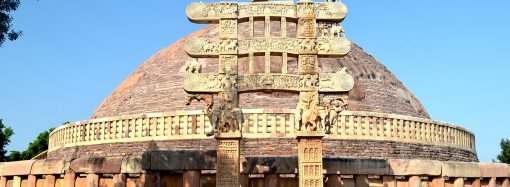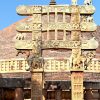आवृतं ज्ञानमेतेन ज्ञानिनो नित्यवैरिणा | कामरूपेण कौन्तेय दुष्पूरेणानलेन च || (Bhagwad Gita 3.39) The knowledge of even the most discerning gets covered by this perpetual enemy in the form of insatiable desire, which is never satisfied and burns like fire, O son of Kunti. Desire devours like fire, it is insatiable. One desire, one craving
आवृतं ज्ञानमेतेन ज्ञानिनो नित्यवैरिणा |
कामरूपेण कौन्तेय दुष्पूरेणानलेन च || (Bhagwad Gita 3.39)
The knowledge of even the most discerning gets covered by this perpetual enemy in the form of insatiable desire, which is never satisfied and burns like fire, O son of Kunti.
Desire devours like fire, it is insatiable. One desire, one craving follows on the back of another. Getting the object of desire might proffer pleasure, but it is temporary, soon to be forgotten in the thirst of another pressing desire. The buddha called desire the cause of suffering. “Desire burns like an unquenchable fire, which never brings happiness to anyone. The wise renounce it, knowing it to be the root of misery.” (Dhammapada verse 186) [v20].
We desire what we like, and we desire what we dislike to disappear from our lives. we desire wealth, fame, progeny and an endless host of things. Desire is a step on what is known as the “ ladder of fall” in the Gita.
ध्यायतो विषयान्पुंस: सङ्गस्तेषूपजायते |
सङ्गात्सञ्जायते काम: कामात्क्रोधोऽभिजायते || 2.62||
While contemplating on the objects of the senses, one develops attachment to them. Attachment leads to desire, and from desire arises anger.
क्रोधाद्भवति सम्मोह: सम्मोहात्स्मृतिविभ्रम: |
स्मृतिभ्रंशाद् बुद्धिनाशो बुद्धिनाशात्प्रणश्यति || 2.63||
anger leads to clouding of judgment, which results in bewilderment of the memory. When the memory is bewildered, the intellect gets destroyed; and when the intellect is destroyed, one is ruined.
Sense objects create attachment and desire, unfulfilled desires lead to anger and so on till the final tumble- impairment of the intellect. With the fall of the intellect, the seat of reason, judgment, discrimination and intuition, comes a complete dissolution of the psychological makeup of man. The intellect in top condition is “designed to guide and direct the mind and its emotions, the body and its perceptions and actions”. With its loss, the guiding compass is lost.
Insidious as desire is, its seat is the mind, intellect and senses
इन्द्रियाणि मनो बुद्धिरस्याधिष्ठानमुच्यते |
एतैर्विमोहयत्येष ज्ञानमावृत्य देहिनम् || Bhagwad Gita 3.40||
The senses, mind, and intellect are said to be breeding grounds of desire. Through them, it clouds one’s knowledge and deludes the embodied soul.
It attacks the very bases of what can take man to the heights of sublimity and reduces him to the base.
Two days back I heard professor Edwin Bryant talk at an online Gita convention. He referenced the very same verses and spoke about capitalism and how it fuels desire and how its ethos of profit for profit’s sake is leading to unprecedented avarice and how it sets in motion the whirlpool of desire
However, Desire has existed much before the advent of capitalism. Rig vedic hymns of creation speak of desire as the primal cause of genesis, there are hymns desiring cattle and wealth . Even the mahabharta war, in the midst of which the Gita is sung is due to the kaurava desire for amassing the entire kingdom. However, the advent of capitalism and globalisation has fanned a materialistic culture, one that has invaded and is threatening to dislodge the very fabric of conscious living that many traditions of the east adhered to.
I remember the simple life in village india . Now media and marketing are fast making inroads and one can see consumerism slowly taking hold. If allowed unabated, the old harmonious way of life will give way to the stresses and strains that we see in our cities not to talk of damage to the environment and other catastrophic fallouts. Simultaneously, I also remember the well repeated adage in our marketing class- we must impel desire in our consumers – the AIDA model where D stands for desire. In this age of cultural imperialism, where western ideology of consuming more is sweeping the world is there an antidote? Can there be a quelling of desire?
There is, In the indic wisdom traditions. In the Kathopnishad it is said that God created the senses facing outwards into the world, so man beholds the external universe and not the internal self (atman). But it is only some wise man desirous of immortality with eyes averted (turned within and his senses turned away) from sensual objects , sees the atman within. This verse is not only “an explanation of the sorrows and limitations of the samsarika world, but also hints on the path trodden by the wise in getting out of this world of tears.” One must begin by taming the senses, mind and the intellect and turning inwards into the repository of all that is infinite in us . In describing a man of solid, stable mind (sthithprajna) Lord Krsna says:
यदा संहरते चायं कूर्मोऽङ्गानीव सर्वश: |
इन्द्रियाणीन्द्रियार्थेभ्यस्तस्य प्रज्ञा प्रतिष्ठिता || 2.58||
One who is able to withdraw the senses from their objects, just as a tortoise withdraws its limbs into its shell, is established in divine wisdom.
Letting the senses graze is the start of the downfall. Something we instinctively indulge in all the time How could one possibly accomplish the feat that lord krsna talks of ? he himself provides the answer
तानि सर्वाणि संयम्य युक्त आसीत मत्पर: |
वशे हि यस्येन्द्रियाणि तस्य प्रज्ञा प्रतिष्ठिता || 2.61||
They are established in perfect knowledge, who subdue their senses and keep their minds ever absorbed in me.
Keeping one’s mind focussed on God, meditating on god , being god conscious can purify the mind and the intellect and tame the senses. In the Gita the lord advises arjuna on various paths to strengthen the mind and the intellect . These are known as the four yogas – Jnana, karma, bhakti and raja yoga- all four are equipped to engender a complete transformation in man and take him towards the ONE goal of life as envisioned in the ancient traditions – God realization. There are other paths as well viz tantra that have the very same goal, and follow the path of inner engineering and reorientation. The buddha constituted the 8 fold path – a moral and ethical way of life that is in its practice transformative.
What has to be clear is this – Desire must be quelled , material desires that is . Spiritual desires or selfless desires should be encouraged till they too are burnt up in the fire of higher realization. Scriptures provide a wonderful guidance, they should be the go to place for understanding ways to outrun desire or other defects besetting the mind and the intellect .
Lord Krsna says:
तस्माच्छास्त्रं प्रमाणं ते कार्याकार्यव्यवस्थितौ |
ज्ञात्वा शास्त्रविधानोक्तं कर्म कर्तुमिहार्हसि || 16.24||
Therefore, let the scriptures be your authority in determining what should be done and what should not be done. Understand the scriptural injunctions and teachings, and then perform your actions in this world accordingly.
Living a conscious, dharmic life, based on the teachings of scriptures can help one overcome the pressing urges of desire. With the demise of desire, one can lead a fuller, more meaningful life , releasing energies for the pursuit of worthwhile goals and initiatives. In Buddhism, it is said that every one has an inherent buddha nature – everyone can be a buddha . Therefore as the Kathopnishad says “arise! Awake!” slay desire, conquer the senses, mind and intellect and realize the buddha within.
 Scared Space
Scared Space 





Leave a Comment
Your email address will not be published. Required fields are marked with *